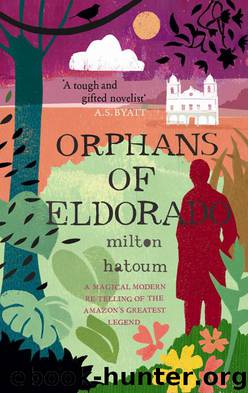Orphans of Eldorado by Milton Hatoum

Author:Milton Hatoum
Language: eng
Format: mobi, epub
ISBN: 9781847678324
Publisher: Canongate Books
Published: 2010-10-07T21:00:00+00:00
Afterword
One Sunday in 1965, before there was TV in the Amazon region, my grandfather asked me to come and have lunch at his house in Manaus. I never refused these invitations, because I knew that, after eating the delicacies prepared by my grandmother, he would ask me to come and converse in the shade of a jambeiro. In reality, it was a monologue, which I interrupted only with questions. That afternoon, my grandfather told me one of the stories he’d heard in 1958, on one of his journeys to the interior of the region.
It was a love story, with a dramatic slant, as happens almost always in literature, and, sometimes, in life. This story also evoked an Amazonian myth: the Enchanted City.
Many natives and dwellers on the banks of the Amazon believed—and still believe—that at the bottom of the river or lake there exists a rich, splendid city, a model of harmony and social justice, where people live as enchanted beings. They are seduced and taken to the bottom of the river by the inhabitants of the waters or the jungle (generally a river dolphin or an anaconda) and only return to our world with the mediation of a shaman, whose body or spirit has the power to go to the Enchanted City, talk to its inhabitants, and, perhaps, bring them back to our world.
I remember my grandfather spent some hours telling this story, and I listened entranced by his eloquence and his theatrical gestures.
Years later, when I read the accounts of the Amazon written by conquistadors and European travellers, I realised that the myth of Eldorado was one of the possible versions and variations of the Enchanted City, which in the Amazon region is also called a legend. Myths which are part of the Indo-European inheritance, but which are also part of Amerindian culture and of many others. For myths, like cultures, travel and are interlinked. They belong to history and to collective memory.
I asked my grandfather where he had heard the story of the orphans. Years later, when I was travelling in the middle reaches of the Amazon, I looked for the narrator in the town he mentioned. He lived in the same house my grandfather had described, and was so old that he didn’t know his own age. He refused to tell his story:
‘I’ve already told it once, to a river trader who came this way and had the goodness to listen to me. Now my memory is very dim, it’s lost its strength . . .’
Download
This site does not store any files on its server. We only index and link to content provided by other sites. Please contact the content providers to delete copyright contents if any and email us, we'll remove relevant links or contents immediately.
| Fairy Tales | Folklore |
| Mythology |
Confessions of an Ugly Stepsister by Gregory Maguire(7346)
Circe by Madeline Miller(7170)
Burn for You (Slow Burn Book 1) by J.T. Geissinger(6598)
A Court of Wings and Ruin by Sarah J. Maas(6422)
A Lesson in Thorns (Thornchapel Book 1) by Sierra Simone(4690)
The Bird and the Sword by Amy Harmon(4542)
Into the Drowning Deep by Mira Grant(3990)
Stolen (Alpha's Control Book 1) by Addison Cain(3837)
The Queen and the Cure (The Bird and the Sword Chronicles Book 2) by Amy Harmon(3535)
Mythology by Edith Hamilton(3362)
Pernicious Red (When The Wicked Play Book 1) by Natalie Bennett(3215)
Run Little Wolf (The Forest Pack Series Book 1) by G. Bailey(3144)
The Queen and the Cure by Amy Harmon(2771)
Lost Boy by Christina Henry(2528)
(Maiden Lane #5) Lord of Darkness by Elizabeth Hoyt(2486)
Mythos by Stephen Fry(2482)
The Fairy Queen (The Dark Queens Book 6) by Jovee Winters(2422)
Persephone by Kitty Thomas(2322)
(Night Walker) by Lisa Kessler(1852)
